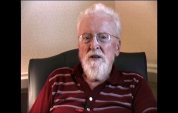3:39 | Red Onines describes the mindset of the soldier struggling to get ashore at Normandy. At first, you struggle to keep your head above water. Then, you kneel and eventually crawl to expose only your face as you get near the beach. Then, out of the water, you crouch and run and zig-zag to present as small a target as possible. (Recorded and contributed by Eric Montgomery)
Keywords : Red Onines sand rifle crouch beach wet cold scared

His father thought you had to be a battleship man to really be in the Navy. Red Onines had always dreamed of serving on a large ship like his father did but the Navy had other ideas. With an eye on upcoming amphibious operations, they formed Naval Beach Battalions to facilitate moving large forces ashore during amphibious invasions.
After a miserable night aboard the landing craft, Red Onines' unit headed into the chaos of D-Day. One step off the ramp and he dropped into water over his head and, in seconds, all his gear except his rifle was gone. As he saw bullets streaking through the water around him, he tried to recall his physics classes, wondering how the water affected the trajectory.
After he crawled from the water on D-Day, the first thing Red Onines noticed was how the landing craft were piling up near shore. Clearing them was one task assigned to others in his unit. An enemy shell knocked out his hearing, but the signalman continued to do his job as well as help the wounded. Years later, he had a chance meeting with Frank Walden, whom he had carried to safety.
By noon on D-Day, Red Onines figured, "If they haven't hit me yet, they must not be trying." He became more relaxed, but was extremely tired. His job as a signalman was to stand at the water's edge and guide incoming craft with semaphore flags.
The widespread destruction was remarkable to Red Onines, as he looks back on D-Day. Death was immediate but destruction and rubble would linger. At the end of the first day, he and a friend went to sleep in a trench and when they awoke at dawn, they could not believe what they saw when they lifted their heads.
Red Onines' weapon was a carbine. He says it was so inaccurate, you might as well just hit someone over the head with it. Still, he gave harassing fire towards the German gun emplacements just to give them something to think about. The randomness of death in an artillery barrage was the thing that bothered him most.
Amid the death and destruction, there was absurdity on Normandy Beach. Red Onines recalls the soldier hunkered down behind a dune, cooking a meal as the invasion raged around him. Then there was the wounded soldier he and a friend stopped to help. When they told the man they weren't doctors, he said, "Get away. I want a GI doc!"
Red Onines sadly recalls the sight of pontoon tanks swamped and sinking as soon as they were discharged from their landing craft. You could see them sinking and still they were ordered to continue. He was sent to the Pacific for more amphibious landing duties but the Atomic bomb took care of those, leaving Normandy as the highlight of his Naval service.
The rest of the young soldiers all agreed with Red Onines. If they were going to get hit, let it be fatal, rather than a severe wound. It was all the luck of the draw. Go to the right, you live. Go to the left, you die. And it could be a matter of inches. The guy next to you gets it and you are untouched.
Red Onines retells the story of how he and friend Charlie Morgan, exhausted from the invasion of Normandy, went to sleep in a trench near the beach and awoke at dawn to the sight of hundreds of Germans. Shocked, they debated whether to fight or surrender. (Recorded and contributed by Eric Montgomery)